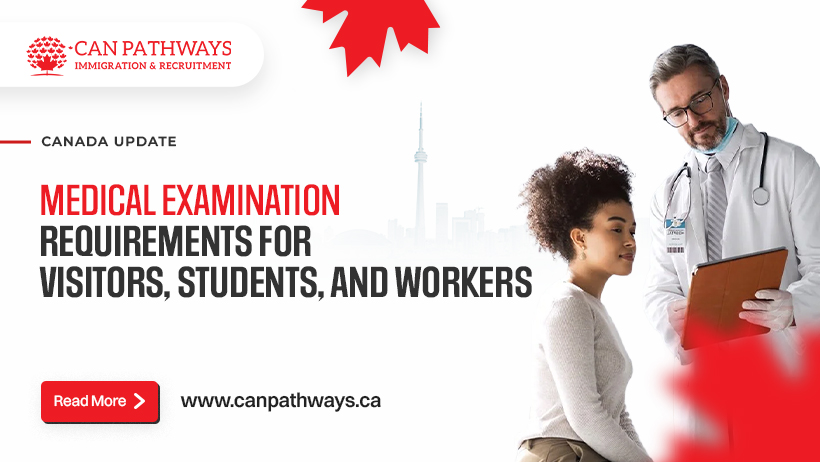The temporary public policy for immigration medical exams (IMEs) has been extended until October 5, 2029.
If you’ve had an IME within the last 5 years, provide the IME number (or unique medical identifier) from that exam when submitting your new application.
Possible exemption from a new IME
You may not need to complete another IME if you meet all of the following:
- You have applied or are applying for permanent or temporary residence.
- You currently live in Canada.
- Your last IME was completed within the past 5 years.
- Your previous IME showed low or no risk to public health or safety.
Medical exam eligibility requirements
If your stay will be 6 months or less
In most cases, you don’t need a medical exam. However, one is required if you plan to work in certain occupations where protecting public health is important.
Examples of such jobs include:
- Roles involving close contact with people, such as:
Health care workers- Clinical laboratory staff
- Patient attendants in nursing or geriatric homes
- Medical students coming to study in Canada
- Medical electives and physicians on short-term locums
- Workers in schools or child-care settings
- Domestic workers and in-home caregivers for children, the elderly, or people with disabilities
- Day nursery employees
- Other similar occupations
- Agricultural workers who have lived in or visited certain countries for 6 months or more within the year before coming to Canada
If your stay will be more than 6 months
You must complete a medical exam if any of the following apply:
- You have lived in or visited one or more of these listed countries or territories for 6 consecutive months or longer in the year before coming to Canada.
- You will be working in an occupation where public health must be protected.
- You are applying for a parent or grandparent super visa.
If a medical exam is required, the visa office will provide instructions on the next steps.
Types of medical exams
There are two kinds of immigration medical exams:
- Standard medical exam
- Streamlined medical exam
Streamlined medical exam
This is a simplified version of the medical exam that IRCC may require in specific urgent or exceptional situations—such as during a humanitarian crisis.
You cannot choose which type of medical exam to take. IRCC will inform you which one applies to your case.
Who can do your medical exam
Your medical exam must be completed by a panel physician—a doctor approved by IRCC. Your personal doctor cannot perform the exam.
The panel physician does not decide the outcome of your medical assessment; IRCC makes that decision. If there are concerns with your results, IRCC will notify you in writing.
You can find an approved panel physician here.
When to get your medical exam
You can take your medical exam before or after you submit your application.
Before applying – Upfront medical exam
You may choose to have your exam done before submitting your application if you are applying to:
- Visit Canada (including under the parent and grandparent super visa)
- Work in Canada
- Study in Canada
To do this, contact a panel physician directly. For an upfront medical exam, the panel physician will carry out a standard medical exam.
After applying
If you wait until after applying, IRCC will send you instructions on:
- When to book your appointment
Which type of medical exam you need
Not following these instructions may result in your application being refused.
What to bring to your medical exam appointment
Make sure you bring the following items:
- Proper identification – Your passport is strongly recommended. Other acceptable documents include:
- National identity card
- Driver’s license (only if issued in Australia, Canada, New Zealand, the United Kingdom, or the United States, and you are still in that country)
Original birth certificate (for children under 18) - Refugee travel document
- Red Cross travel document
- UN laissez-passer
- Seaman’s book
- Organization of American States travel document
- Refugee protection claimant document
- Glasses or contact lenses (if you use them)
- Medical reports or test results for any past or existing medical conditions
- List of your current medications
- Medical Report form (IMM 1017E or IMM 1020E) if you are not having an upfront medical exam – IRCC will send you this form
- Four recent photographs – only if the panel physician does not use eMedical (check with the panel physician in advance)
If you have been vaccinated before
Bring any available proof of past vaccinations, such as records for:
- Diphtheria
- Tetanus
- Pertussis (whooping cough)
- Polio
- Haemophilus influenzae type b
- Measles
- Mumps
- Rubella
- Rotavirus
- Hepatitis B
- COVID-19
Providing proof of vaccination is optional. If you consent, the panel physician will:
- Record your vaccination history
- Share this information with IRCC
If you are referred for an X-ray or other medical tests, you may be required to show your identification again at the testing location.
What you will need to pay for
You are responsible for covering all costs related to your medical exam, including:
- The fee for the doctor or radiologist
Any required special tests, investigations, or treatments
Fees for any specialists you are referred to
If you choose to receive any vaccines offered by the panel physician, you may also have to pay for them—this will depend on the physician’s fees and local regulations.
If your application is refused after the medical exam, these fees are non-refundable.
Note: Refugees and asylum seekers may be exempt from paying for:
- Medical exams
- Vaccinations
If you can’t complete your medical exam
In some cases, you or a family member may be unable to complete the medical exam because:
- There are exceptional circumstances, or
- There is no access to a panel physician in your area
If this applies to you, submit a letter of explanation outlining why you cannot meet this requirement. IRCC will review your request.
How to contact IRCC:
- Use the web form and select “Add a document to your application”
- Call the IRCC Client Support Centre
What to expect during your medical exam
Follow the instructions in your notice and complete the specific type of medical exam assigned to you:
- Standard medical exam
- Streamlined medical exam





